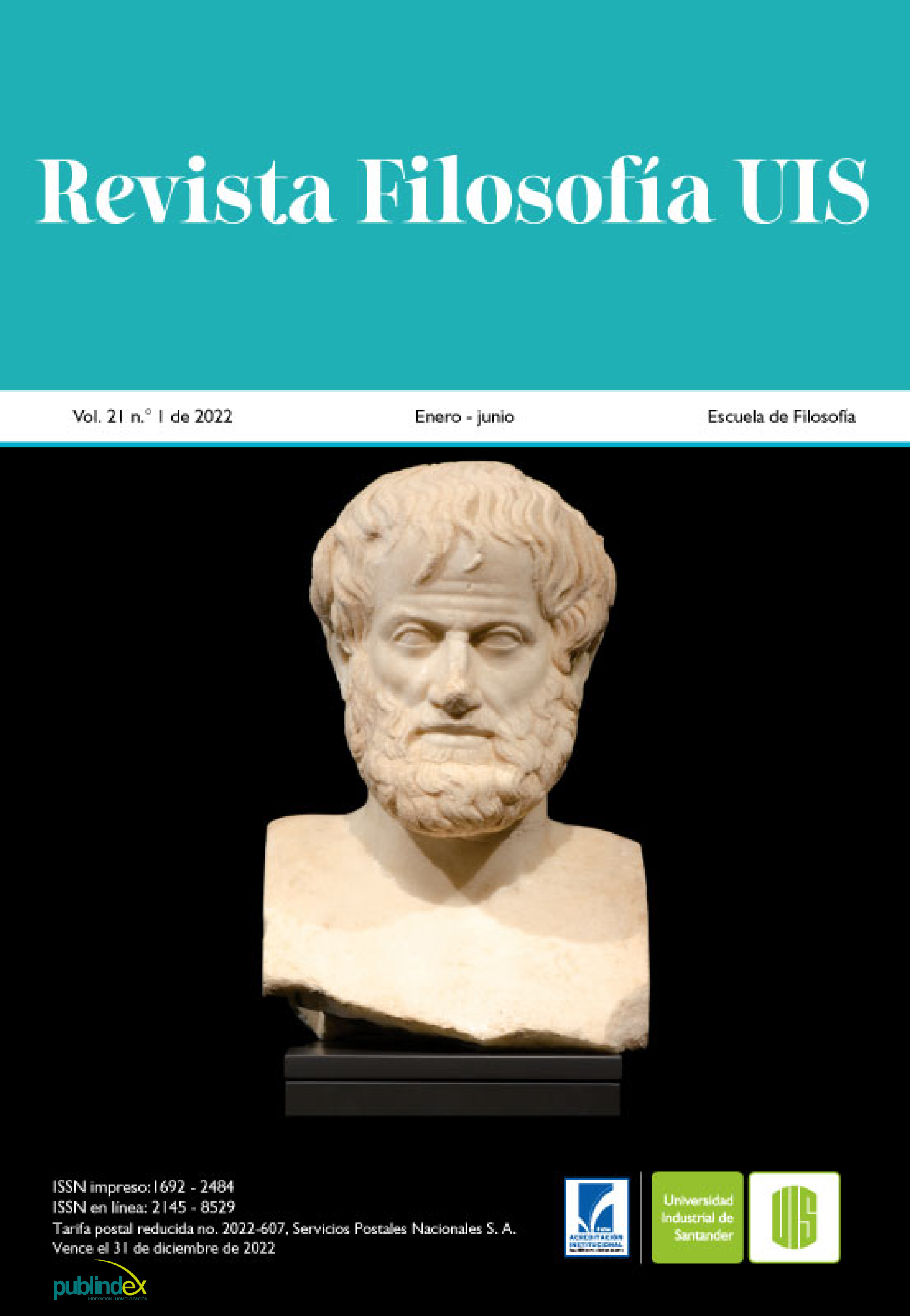Rhetoric, Moral and Human Nature in the Sophistic of the Ancient Greek World
Published 2022-01-03
Keywords
- sophistry,
- rhetoric,
- human nature,
- Plato,
- ancient philosophy
- ancient Greece ...More
How to Cite
Copyright (c) 2022 Revista Filosofía UIS

This work is licensed under a Creative Commons Attribution 4.0 International License.
Abstract
the objective of this research is twofold; On the one hand, the conceptions on the history of philosophy that insist on starting with Plato are questioned, and, on the other hand, it focuses on the philosophical movement known in ancient Greece as sophists, in order to recognize and reflect on the contributions of this movement for the later development of western philosophical and scientific thought. In this sense, it explains the context of its origin and development in ancient Greece, the importance of its teachings –especially rhetoric and the study of language– for later reflection on education, politics, law, psychology and modern anthropologies, his redefinition of morality centered on a self-constitutive human nature, as well as the criticisms to which they were subjected –mainly by Plato– and which partly built and consolidated the pejorative image that, for centuries, accompanied his name. On what were these criticisms based? Were these criticisms founded?
Downloads
References
- Anónimo (1996). Discursos dobles. En Sofistas. Testimonios y fragmentos (pp. 459-484) (A. Melero, trad.). Gredos.
- Antifonte (1996). Sobre la verdad. En Sofistas: testimonios y fragmentos (pp. 327-394) (trad. A. Melero). Gredos.
- Ayala Blanco, F. (2009). Reflexiones en torno a la sofística. Estudios Políticos, 9(16), 125-147. http://dx.doi.org/10.22201/fcpys.24484903e.2009.0.18778
- Bieda, E. (2008). Antifonte sofista. Un utilitarismo naturalista. Méthexis, 21, 23-42. https://doi.org/10.1163/24680974-90000529
- Cadavid, L. (2014). Los sofistas: maestros del areté en la paideia griega. Revista Perseitas, 2(1), 37-61. https://doi.org/10.21501/23461780.1128
- Calvo Martínez, T. (1986). De los sofistas a Platón: política y pensamiento. Editorial Cincel.
- Caño-Guiral, J. (2004). Sofística Y Sofistas. Para leer a Platón. Humanidades: Revista de la Universidad de Montevideo, 4(1), 49-88. http://revistas.um.edu.uy/index.php/revistahumanidades/article/view/133
- Cuadros Contreras, R. (2013). Sofística, retórica y filosofía. Praxis Filosófica, 37, 75-93. https://doi.org/10.25100/pfilosofica.v0i37.3454
- Gómez-Lobo, A. (1991). El diálogo de Melos y la visión histórica de Tucídides. Estudios Públicos, 44, 247-273. https://www.cepchile.cl/cep/estudiospublicos/n-31-a-la-60/estudios-publicos-n-44/el-dialogo-de-melos-y-lavision-historica-de-tucidides
- Guthrie, W. K. C. (1994). Historia de la filosofía griega III. Siglo V. Ilustración. Gredos.
- Hermosa Andújar, A. (2004). El Diálogo de Melos o la conservación del Imperio. Araucaria. Revista Iberoamericana de Filosofía, Política y Humanidades, 6(11), 48-61. https://idus.us.es/handle/11441/45918
- Hermosa Andújar, A. (2016). La felicidad del mal. Res Publica. Revista de Historia de las Ideas Políticas, 19(1), 35-47. https://doi.org/10.5209/rev_RPUB.2016.v19.n1.52204
- Jaeger, W. (2002). Paideia: los ideales de la cultura griega. Fondo de Cultura Económica.
- Melero, A. (1996). Introducción. En Sofistas. Testimonios y fragmentos. Gredos.
- Ortega, D. (1999). Los valores de la polis en la sofística y en Platón. Anales del Seminario de Historia de la Filosofía, 16, 57-83. https://revistas.ucm.es/index.php/ASHF/article/view/ASHF9999110057A
- Palazzo, S. (2016). Heráclito y Parménides. El Uno y lo múltiple. Bonalletra Alcompas S.L.
- Platón (1985a). Apología. En Diálogos I (pp. 137-186) (J. Calonge Ruiz, trad.). Gredos.
- Platón (1985b). Protágoras. En Diálogos I (pp. 487-589) (C. García Gual, trad.). Gredos.
- Platón (1987). Gorgias. En Diálogos II (pp. 7-145) (J. Calonge Ruiz, trad.). Gredos.
- Platón (1988a). República. En Diálogos IV (C. Eggers Lan, trad.). Gredos.
- Platón (1988b). Teeteto. En Diálogos V (pp. 137-318) (A. Vallejo Campos, trad.). Gredos.
- Platón (1988c). Fedón. En Diálogos III (pp. 7-142) (C. García Gual, trad.). Gredos.
- Protágoras (1996). Discursos demoledores. En Sofistas. Testimonios y fragmentos (pp. 77-140) (A. Melero, trad.). Gredos.
- Ramírez Vidal, G. (2003). El sofista y el filósofo en la Grecia Clásica. Nova Tellus, 21(2), 77-91. https://revistas-filologicas.unam.mx/nouatellus/index.php/nt/article/view/118
- Ramírez Vidal, G. (2016). La invención de los sofistas. Universidad Nacional Autónoma de México.
- Romilly, J. (1997). Los grandes sofistas en la Atenas de Pericles. Una enseñanza nueva que desarrolló el arte de razonar. Seix Barral.
- Savater, F. (2014). La aventura del pensamiento. Debolsillo.
- Villar, F. (2021). El retrato platónico de los sofistas del siglo V a. C. Revista de Filosofía, 46(1), 81-98. https://revistas.ucm.es/index.php/RESF/article/view/65879
- Whitehead, A. (1978). Process and reality. En D. R. Griffin y D. W. Sherburne (Ed.). The Free Press.

